GEO vs SEO: What’s the Difference and Why It Matters Now
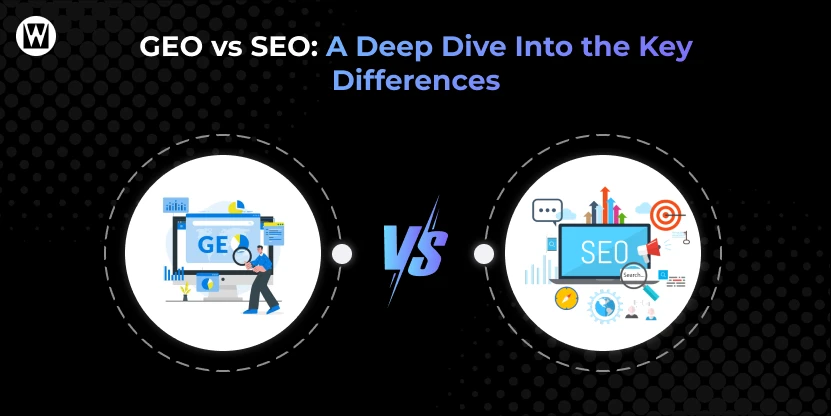
The digital search landscape is undergoing a seismic shift. For over two decades, Search Engine Optimization (SEO) has dominated how users discover content online. But with the rise of AI-driven search platforms like ChatGPT, Google SGE, Perplexity, and BingChat, a new approach is emerging: Generative Engine Optimization (GEO). Understanding the differences between SEO and GEO isn’t just a competitive advantage anymore—it’s essential for brands that want to stay visible and relevant in 2026 and beyond.
Feeling unsure about how AI tools like ChatGPT and Google SGE are changing online visibility? You’re not alone.
Many businesses and marketers are rethinking their strategies as traditional SEO faces competition from AI-generated answers. This guide breaks down the shift from ranking-based SEO to reference-based GEO, so you can adapt and stay competitive.
In this guide, we’ll explore the difference between Generative Engine Optimization (GEO) vs Search Engine Optimization (SEO)—what makes each unique, how they overlap, and why understanding this evolution is critical for your digital strategy.
Understanding the Foundations: SEO and GEO Explained
What is Search Engine Optimization (SEO)?
SEO is the practice of optimizing your website to rank higher in traditional search engine results like Google and Bing. The main goal is to drive organic traffic by aligning your content with the algorithms that determine how search engines index and rank web pages.
Key Components of SEO:
- Keyword Research: Identifying terms people search for
- On-Page Optimization: Using those terms effectively
- Backlinks: Gaining authority through references
- Technical SEO: Ensuring crawlability, mobile optimization, and page speed
SEO has powered organic search for years, and it continues to be vital. But it was built for search engines that retrieve and rank web pages, not generate answers.
What is Generative Engine Optimization (GEO)?
GEO is an emerging strategy that optimizes content for visibility within AI-generated responses. Rather than ranking in a list of results, the goal is to get cited or referenced directly within the output of tools like ChatGPT, SGE, or Perplexity.
Key Components of GEO:
- Clarity & Structure: Using bullet points, summaries, and scannable formatting
- Citation Optimization: Creating content that can be quoted or linked
- Entity Recognition: Defining terms, brands, and facts clearly
- Statistical and Factual Strength: Providing accurate, referenceable data
As AI tools become primary sources of information, GEO is increasingly critical for digital visibility.
“ In traditional search, visibility means ranking. In generative search, visibility means being referenced.
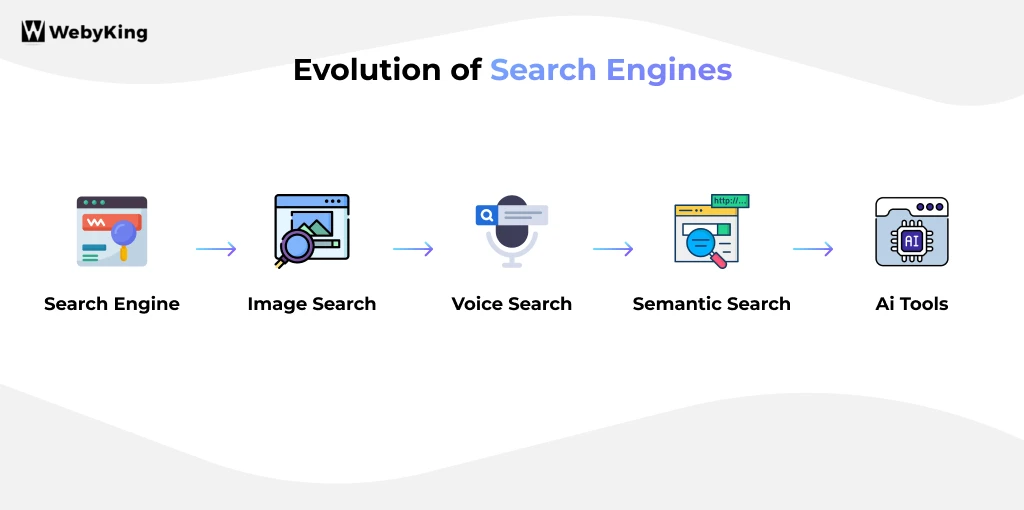
Traditional SEO vs GEO: What's Really Different?
| Aspect | SEO (Search Engine Optimization) | GEO (Generative Engine Optimization) |
|---|---|---|
| Goal | Rank higher in search engine result pages (SERPs) | Be cited or referenced in AI-generated search responses |
| Target Platforms | Google, Bing, Yahoo | ChatGPT, Google SGE, Perplexity, Bing Chat |
| Content Format | Keyword-focused, detailed content | Structured, scannable content with clear citations |
| Measurement Metrics | Click-through rate, bounce rate, organic traffic | Citation frequency, brand mentions in AI tools, user sentiment |
| User Behavior | Users click links to visit websites | Users consume synthesized information without always clicking |
| Optimization Techniques | Backlink building, meta descriptions, technical SEO | Structured formatting, entity optimization, statistical insights |
| Content Update Cycle | Influenced by Google algorithm updates | Influenced by LLM training cycles and retrieval accuracy |
| Visibility Type | Appears in search engine rankings | Appears in AI answers, summaries, or overviews |
| Business Impact | Drives traffic and conversions through organic visibility | Builds authority, improves brand visibility within AI and generative search platforms |
| Ideal Use Case | Evergreen blog posts, landing pages, service/product pages | AI-extracted content, FAQ blocks, stat-rich guides, conversational and question-answer formatted posts |
Ranking vs Referencing: A Paradigm Shift
Traditional SEO focuses on ranking: Where does your website appear in search results? GEO focuses on referencing: Does the AI cite your brand, content, or answer in its response?
Traffic vs Trust: What Each Strategy Prioritizes
SEO measures success through click-through rates, bounce rates, and organic traffic. GEO success is measured by how often your brand is mentioned, cited, or positively represented in AI-generated content.
Platform Behavior: Google vs ChatGPT, Perplexity, SGE
- Google: Lists links, shows snippets
- ChatGPT: Synthesizes multiple sources into a coherent response
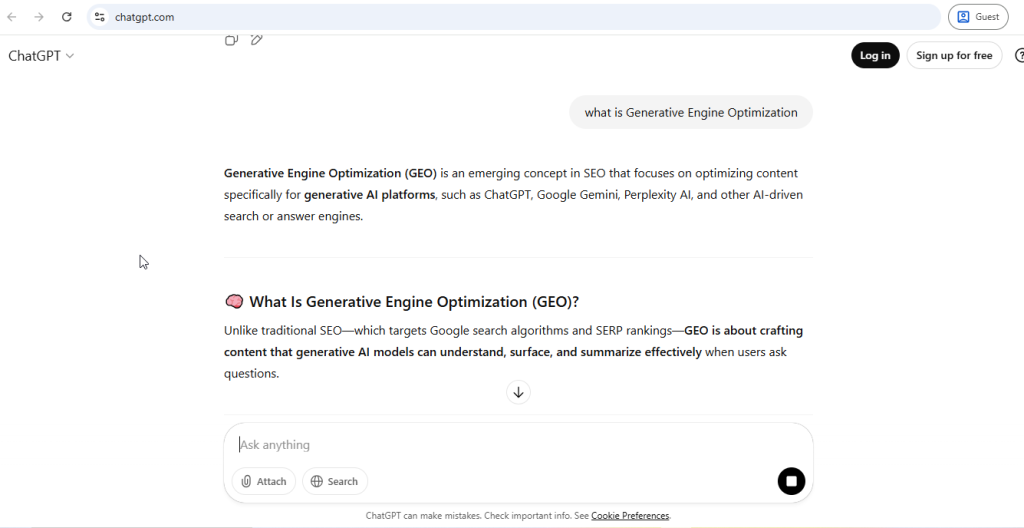
- Perplexity: Combines citations with readable overviews
- SGE: Adds AI-powered overviews directly above organic search results
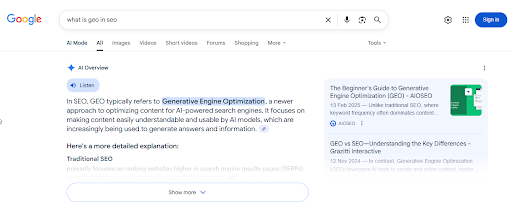
The shift from search pages to search experiences requires brands to optimize differently.
The Rise of GEO: Why It’s More Than a Buzzword
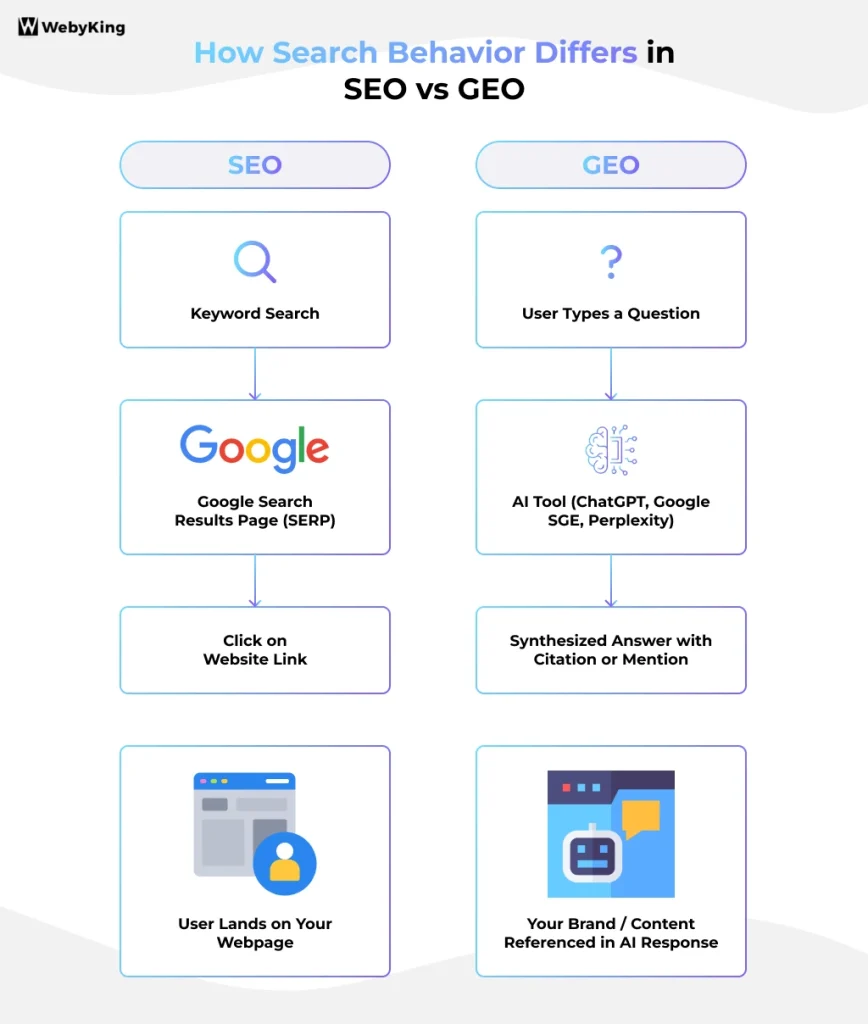
AI Search Trends Shaping 2026
People using AI tools like Google SGE and ChatGPT often type questions that are longer and sound more like how we speak—usually over 20 words. These searches are usually more detailed and specific than the short keywords used in traditional search. As a result, tools like SGE and ChatGPT are changing the way younger users find information online.
The shift isn’t theoretical — it’s happening now. Google displays SGE in 86.8% of search queries, meaning the AI layer is rapidly becoming the default view for most users.
The Zero-Click Challenge for SEO
AI-generated answers reduce the need for users to click on traditional links. A “zero-click” experience means users find what they need in the AI output, never visiting your site—unless you’re cited directly.
This challenge is amplified by the fact that less than 20% of all web content is regularly referenced by generative AI tools. GEO isn’t just an option — it’s now a critical strategy to remain discoverable.
“ The future of search isn’t 10 blue links—it’s zero-click results powered by AI. If you’re not visible in the AI layer, you’re invisible.
— Rand Fishkin, Co-founder of SparkToro
How Brands Are Adapting to Generative Search
Smart brands are now optimizing content not just for search engines but also for how AI systems understand and retrieve information. They’re reformatting blog posts, improving metadata, and ensuring clarity in facts and structure.
To keep up with changing search trends, it’s a good idea to consider professional content writing services that understand how to create clear, structured content built for both traditional SEO and AI-generated results.
Optimizing for GEO Without Losing SEO Ground
Content Structuring: Think Snippets, Not Just Keywords
Use H2s and bullet points to organize answers. Frame content in a way AI models can extract easily—”In summary,” “Key takeaways,” “Step-by-step guide,” etc.
Building Authority for Both Engines
GEO still rewards E-E-A-T (Experience, Expertise, Authoritativeness, Trustworthiness), just like SEO. Use first-hand data, expert opinions, and citations from reputable sources.
“
Even in AI-generated results, SEO plays a key role.
In fact, around 40.6% of AI Overviews cite content from Google’s top‑10 organic results, proving that strong traditional rankings can directly impact generative visibility.
Tools That Help You Target Both
- Ahrefs & SEMrush: Great for traditional SEO insights (or consider professional SEO Services to implement insights effectively)
- SGE Tracker / Glimpse: Track brand visibility in Google SGE
- Profound, Goodie: Monitor how your content appears in LLMs like ChatGPT
A combined toolkit gives you insight into both the algorithm and the AI.
Real-World Use Case: How GEO Boosted Organic Mentions by 40%
Background: The Challenge with SEO Plateau
A SaaS brand had consistent top-10 SEO rankings but declining traffic from Google. The culprit? Google SGE answers were satisfying users before they clicked.
Strategy Shift: Layering GEO on Top of SEO
The brand restructured their blog content using:
- Summary boxes
- Expert quotes
- Clearly attributed data
- Short, skimmable paragraphs
They also ran synthetic prompts in tools like ChatGPT and Perplexity to monitor mentions.
Outcome: Visibility in Perplexity, ChatGPT, and Google SGE
Within three months, the brand saw a 40% increase in unlinked brand mentions within generative tools and an increase in direct traffic from citation tools.
SEO + GEO in Action: A Framework for 2026 and Beyond
Aligning User Intent with AI Answer Logic
GEO is about understanding how AI interprets prompts. Frame content with questions and answers, examples, comparisons, and fact-supported claims.
Structuring Content for Dual Indexing
Your content should:
- Load fast (for SEO)
- Be organized and factually dense (for GEO)
- Include schema markup, FAQs, and internal links
Strategic Metrics to Track: Beyond CTR
- SEO: Organic traffic, backlinks, keyword rankings
- GEO: Mentions in AI tools, accuracy of citations, user trust
Use analytics to align your content performance across both systems.
Final Thoughts: Prepare Your Brand for the Next Evolution of Search
The future of search isn’t just about ranking – it’s about being remembered by the model. If SEO got you found, GEO will get you referenced. Optimizing for both will ensure your content thrives in 2026 and beyond.
What You Should Do Today
- Audit your top SEO pages
- Add structure, clarity, and attribution
- Start monitoring how your brand appears in AI tools
Ready to Audit Your Content for the AI Era?
- Does your content show up in Google SGE?
- Have you checked how ChatGPT references your brand?
- Is Your Content Ready for AI Search?”
Is your content structured for both SEO and GEO?
If not, request a free SEO + GEO audit from our experts today.
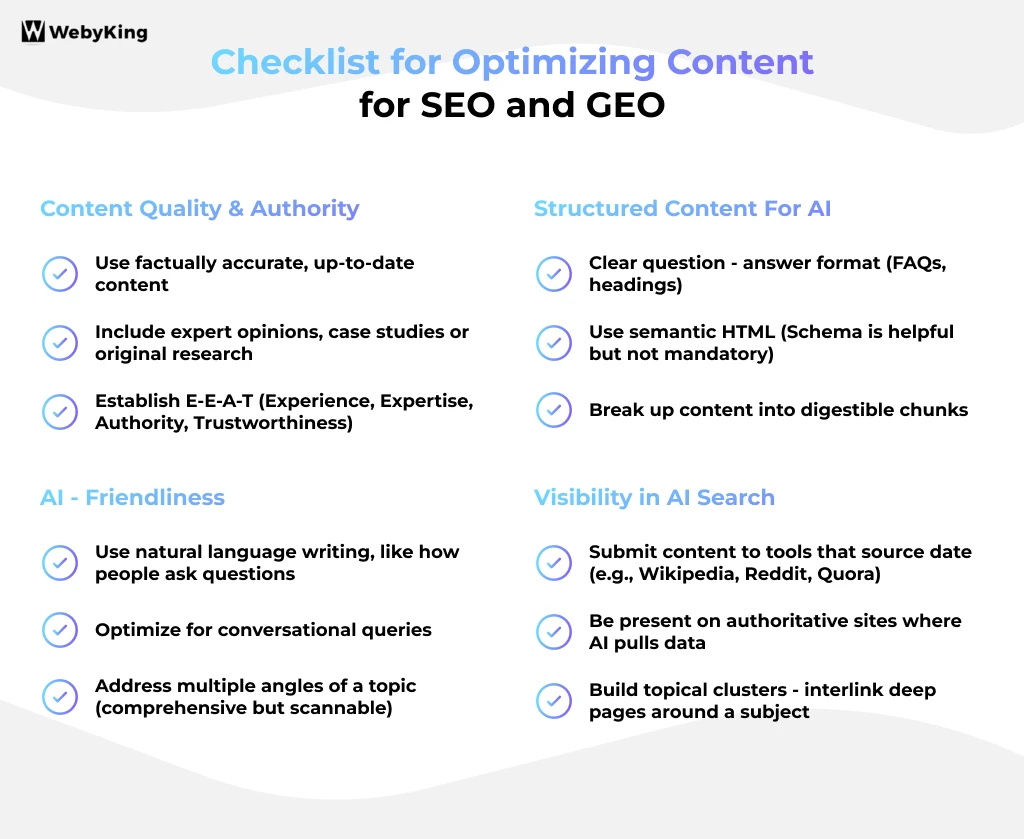
How to Future-Proof Your Strategy
- Invest in both SEO and GEO toolkits
- Train content teams on dual-purpose optimization
- Stay ahead of AI updates and prompt behavior changes
Glossary
- GEO (Generative Engine Optimization): Optimizing content to appear in AI-generated responses.
- SEO (Search Engine Optimization): Optimizing for rankings in traditional search results.
- SGE (Search Generative Experience): Google’s AI-enhanced search feature.
- LLM (Large Language Model): AI systems like ChatGPT that generate human-like responses.
- E-E-A-T: Google’s quality framework—Experience, Expertise, Authoritativeness, Trustworthiness.
- Zero-click: Search results where users get answers without clicking any link.
FAQs: Common Questions About GEO vs SEO
Will GEO replace SEO entirely?
No. Traditional search engines still dominate traffic. GEO complements SEO and is critical for the growing share of AI-driven discovery.
Can I use the same content for both?
Yes, with smart formatting. Use keyword targeting for SEO and structure, summaries, and clarity for GEO.
What are the best GEO optimization techniques?
- Use quotes, stats, and expert insights
- Frame content in bullet points or summaries
- Use schema markup and entity linking
How does Google SGE select content?
It draws from high-authority sources, structured content, and clear, factual information. SEO performance still influences inclusion in AI overviews.
Do backlinks still matter for GEO?
Yes, but their role shifts. Backlinks improve authority, which helps with both SEO rankings and the trustworthiness signals AI models look for.
What is the difference between Google SEO and GEO?
Google SEO focuses on ranking your site in traditional search results. Google GEO is about getting your content featured in AI-generated answers (like SGE), even if users don’t visit your site.
Ravi Makhija, the visionary Founder and CEO of WebyKing, is a seasoned digital marketing strategist and web technology expert with over a decade of experience. Under his leadership, WebyKing has evolved into a premier full service web and marketing agency, delivering innovative solutions that drive online success. Ravi’s deep understanding of the digital landscape combined with his passion for cutting-edge technologies empowers him to consistently exceed client expectations and deliver results that matter.











